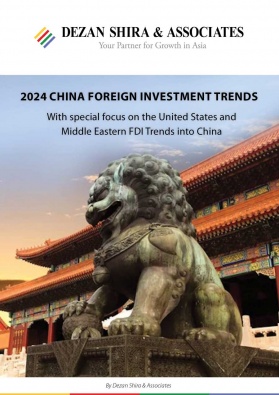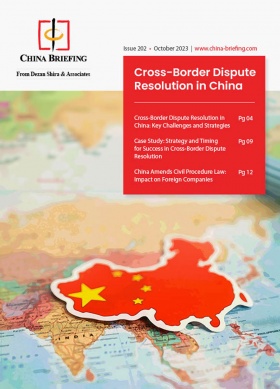Beijing’s New Plan to Boost the Service Industry and Attract Foreign Investment
A new plan to boost the Beijing service sector outlines a host of tasks to improve the city’s investment environment and ease of doing business. Key measures targeting foreign investment include expanding market access to foreign companies in key service fields, facilitating cross-border personal information transfer and cross-border funding, and optimizing visa procedures for foreign talent.
China’s State Council has agreed in principle on a new plan to expand and develop the Beijing service sector. The Working Plan for Supporting Beijing in Deepening the Construction of a Comprehensive Demonstration Zone for the Expansion and Opening Up of the National Service Industry (the “Working Plan”) outlines 23 tasks for developing the city’s service industry, including several aimed at increasing the participation of foreign companies.
While not exclusively aimed at attracting foreign investment, the Working Plan outlines several measures to improve the business environment for foreign companies, including lifting foreign ownership caps in certain sectors, optimizing visa procedures, improving cross-border data transfer and funding procedures, and streamlining government service and administrative procedures.
Below, we highlight some of the key commitments to improving Beijing’s business environment and enhancing the foreign investment landscape raised in the Working Plan.
Expanding access for foreign companies in key service sectors
The Working Plan commits to improving market access and lifting foreign ownership caps in several industries, including telecommunications, medical services, culture and education, and professional services.
A key pledge is to remove the foreign ownership cap in the field of value-added telecommunications in Beijing. The specific sectors include information services businesses (such as mobile app stores), internet access service businesses, and other value-added telecom businesses. However, restrictions will remain for online publishing services and Internet access services to anything other than individual users.
In addition, it states that Beijing will further research and expand the opening of value-added telecom services “when appropriate”, indicating further relaxation is to come.
Currently, per the latest edition of the Negative List for Foreign Investment Access, the foreign share of value-added telecom businesses cannot exceed 50 percent, and basic telecom businesses must be controlled by the Chinese party.
In addition to telecoms, the Working Plan also calls for:
- Supporting qualified foreign doctors to open clinics in Beijing, and exploring equity incentive methods for foreign employees in medical research and development companies in the field of stem cells and genetics;
- Decentralizing the approval authority to the district level for foreign investment in the establishment of performance, entertainment, and internet service venues;
- Supporting wholly foreign-owned enterprises in establishing commercial vocational training institutions; and
- Supporting overseas insurance companies to directly initiate and establish insurance asset management companies.
Strengthening the digital economy and improving the data protection regime
The Working Plan outlines several tasks for the city to boost the development of the digital economy, enhance its overall level of digitization, and improve the digital regulatory environment.
The plan also calls for increasing cooperation with members of the Digital Economy Partnership Agreement (DEPA) in areas such as digital identity, digital inclusion, cybersecurity, financial technology, and logistics. Among other things, the plan states that Beijing will seek to cooperate with DEPA members in piloting paperless trade.
The DEPA is a trade agreement between New Zealand, Singapore, and Chile focused on the digital economy. China applied to join the DEPA in 2021 but will have to make significant changes to its current cybersecurity and data protection regulations in order to meet the agreement’s requirements.
The mention of the DEPA in the Working Plan suggests the government may be considering piloting policies that align with the DEPA’s benchmarks before potentially rolling them out to more areas of China.
The Working Plan also mentions methods to facilitate data transactions, including cross-border data transmission.
For instance, the Working Plan states that Beijing will “develop standard contract guidelines for data transactions and issue a negative list and caution list for data transactions”. This is likely in reference to plans to ease requirements on cross-border data transfer (CBDT), which will include establishing “green channels” for qualified foreign companies to export data, and pilot a list of “general data” that can be transferred freely across the border in Beijing, Tianjin, and Shanghai.
China’s personal information (PI) protection rules require companies to undergo certain procedures, such as a security assessment, to export PI out of China, which has added to the compliance burden for foreign companies in particular.
The Working Plan also calls for “carrying out data export security assessment, personal information export standard contract filing, and personal information protection certification [the three mechanisms for exporting PI] to explore and form a mechanism that can both facilitate data flow and ensure security.”
While the plan is not clear on exactly how Beijing might facilitate CBDT and PI protection procedures for companies, it indicates that further measures will be implemented to make compliance easier for companies.
Facilitating cross-border funding
The Working Plan vows to further liberalize forex registration procedures and facilitate cross-border transfer of funds, building upon recent efforts to liberalize the transfer of funds in and out of China.
In May 2023, China’s monetary authorities expanded a pilot currency conversion program to Beijing. This cash pooling program enables certain eligible MNCs to integrate multi-currency cash pools, significantly facilitating the cross-border utilization of funds.
In September 2023, Beijing released a draft plan to support unrestricted fund transfers related to legitimate foreign investments, streamlining the inflow and outflow of capital. This signals a significant relaxation of restrictions on foreign capital and is a major reform under the capital account.
The Working Plan calls for promoting “cross-border financing facilitation pilot projects” and states that Beijing will “deepen the pilot program of integrating domestic and foreign currency bank settlement account systems and continue to expand the scope of participating banks”.
In addition, it states that it will expand the pilot cash polling program for multinational companies, and “explore and optimize quota management, and improve the efficiency of cash pools”.
Finally, the plan reiterates that all legitimate funds that are related to foreign investments can be freely remitted in and out of China “without delay”, reiterating the requirements laid out in the draft plan to support restricted fund transfers released in September.
Improving business and investment environment
Beijing’s plans to improve the foreign investment environment involve continuous efforts to reduce trade costs and barriers. Initiatives to ease cross-border commerce include:
- Support the establishment of a joint working mechanism for trade facilitation and supervision.
- Allowing ordinary cosmetics with only color or fragrance differences to not undergo retesting or reevaluation, except for health or safety considerations.
- Exploring an international trade “single window” system for interconnectedness and information sharing with key trading partners, thereby promoting the electronic transmission of trade documents. Specialized features will be added to the international trade “single window,” including a service trade section.
- Expanding international passenger and freight routes to Europe and the US and launching a pilot program for exporting low-orbit satellites by private enterprises.
The Working Plan also outlines several initiatives for improving the ease of doing business and easing administrative burdens on companies.
For instance, the city aims to transform its functions by accelerating the development of digital government services. Proposed initiatives include piloting mutual cross-border recognition of electronic signature certificates and mechanisms for electronic contracts, including in the fields of public services, finance, and commerce.
Moreover, in key locations (presumably areas such as development zones and industrial parks), it plans to achieve 100 percent online processing for high-frequency administrative services and implement a “one appointment max” principle for handling administrative permits related to new business formats and models.
Beijing will also seek to establish a one-stop service system for foreign investment, develop investment guidelines for key sectors, and provide comprehensive services and guidelines for high-frequency matters.
Facilitating visa procedures for foreign talent
The Working Plan outlines several visa policies aimed at attracting foreign talent to the city.
First, the city aims to streamline the issuance of talent visas and facilitate the visa process for short-term stays related to scientific research and other purposes. In addition, it will allow accompanying family members of experts transferred within Beijing-based foreign-invested enterprises to receive resident permits with the same duration as that of the expert. High-level management personnel of foreign companies planning to establish branches or subsidiaries in Beijing will be granted visas or residence permits valid for up to two years, with accompanying family members eligible for a residence permit of the same duration.
The city also plans to expand the “one-stop acceptance and parallel approval” system for foreign work permits and residence permits throughout the city. Foreign high-end talents with valid visas or residence permits intending to work in Beijing will be able to directly apply for work permits in China. Moreover, Beijing will “support international students in higher education institutions to take on part-time work”, something which is generally not permitted in China.
The tasks outlined in the Working Plan follow a series of changes to China’s visa policies implemented in 2023. In August, China’s Ministry of Public Security (MPS) released measures to enable people traveling to China for business or trade activities to apply for a business visa on arrival. In September, the Ministry of Foreign Affairs (MFA) announced a simplification of its visa application process, simplifying the information that applicants need to provide on the application form.
In November, China also announced a unilateral 15-day visa-free entry policy for holders of ordinary passports from France, Germany, Italy, the Netherlands, Spain, and Malaysia, during the period from December 1, 2023, to November 30, 2024.
Implementing the plan to boost the Beijing service sector
The tasks outlined in the Working Plan underscore Beijing’s commitment to fostering a more business-friendly environment and attracting increased foreign investment. The initiatives to streamline trade processes, improve visa policies, and enhance the overall investment landscape signal a proactive approach toward global economic integration.
However, the success of these measures hinges on their effective implementation. As these policies are translated into action, it will be crucial to monitor the granular details of their execution. We anticipate that more detailed implementation plans will be released in the future, shedding light on the practical aspects and timelines, which will play a pivotal role in determining the ultimate impact on making Beijing an even more attractive destination for businesses and foreign investment.
The city of Beijing also acts as a pilot area for various new policies and is leading the opening and reform of China’s service sector. Policies and measures to open up the Beijing service sector, if successfully implemented, may later be rolled out to other areas of China.
About Us
China Briefing is written and produced by Dezan Shira & Associates. The practice assists foreign investors into China and has done so since 1992 through offices in Beijing, Tianjin, Dalian, Qingdao, Shanghai, Hangzhou, Ningbo, Suzhou, Guangzhou, Dongguan, Zhongshan, Shenzhen, and Hong Kong. Please contact the firm for assistance in China at china@dezshira.com.
Dezan Shira & Associates has offices in Vietnam, Indonesia, Singapore, United States, Germany, Italy, India, Dubai (UAE), and Russia, in addition to our trade research facilities along the Belt & Road Initiative. We also have partner firms assisting foreign investors in The Philippines, Malaysia, Thailand, Bangladesh.
- Previous Article Traveling to China After Reopening – What’s Changed?
- Next Article New Version of Foreign Permanent Resident ID Card to be Issued in China Starting December 1, 2023









